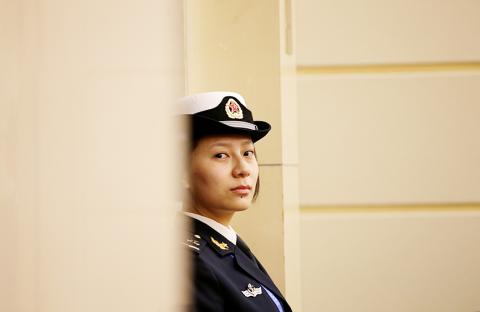China is to show off new warships, including nuclear submarines and destroyers, at a parade on Tuesday marking 70 years since its navy’s founding, a senior commander said yesterday, as Beijing flexes its increasingly well-equipped military muscle.
Chinese President Xi Jinping (習近平) is overseeing a sweeping plan to refurbish China’s military by developing everything from stealth jets to aircraft carriers as China ramps up its presence in the South China Sea and around Taiwan.
The Chinese People’s Liberation Army Navy (PLAN) has been a key beneficiary of the modernization plan, as China looks to project power far from the country’s shores, and protect its trading routes and citizens overseas.

Photo: Reuters
Beijing last month unveiled a target of a 7.5 percent rise in defense spending for this year, a slower rate than last year, but still outpacing China’s economic growth target.
PLAN Vice Admiral Qiu Yanpeng (邱延鵬) told reporters in the eastern city of Qingdao that Tuesday’s naval parade — likely to be overseen by Xi himself, although China has not confirmed that — would feature 32 vessels and 39 warplanes.
“The PLAN ships and aircraft to be revealed are the Liaoning aircraft carrier, new types of nuclear submarines, new types of destroyers, as well as fighter aircraft,” Qiu said, without giving details. “Some ships will be revealed for the first time.”
It is not clear if China’s second carrier, an as-yet unnamed ship developed and built purely in China, is also to take part, but in the past few days, state media have run stories praising recent sea trials.
About a dozen foreign navies are also taking part. While Qiu did not give an exact number, China has announced the parade would include ships from Russia, Singapore, India, Thailand and Vietnam.
Vietnam frequently complains of Chinese military activity in the disputed South China Sea, where Taiwan also has claims.
China’s last naval battles were with the Vietnamese in the South China Sea, in 1974 and 1988, although these were relatively minor skirmishes.
Qiu reiterated China’s frequent stance that its armed forces are not a threat to anyone.
“It is fair to say that the PLAN has not brought war or turbulence to any place,” but China has been scarred by its past and needs good defenses, Qiu said.
“A strong navy is essential for building a strong maritime country,” Qiu said. “From 1840 to 1949, China was invaded by foreign powers from the sea more than 470 times, which caused untold suffering and deep wounds to the Chinese nation.”

Tropical Storm Gaemi strengthened into a typhoon at 2pm yesterday, and could make landfall in Yilan County tomorrow, the Central Weather Administration (CWA) said yesterday. The agency was scheduled to issue a sea warning at 11:30pm yesterday, and could issue a land warning later today. Gaemi was moving north-northwest at 4kph, carrying maximum sustained winds near its center of up to 118.8kph and gusts of 154.8kph. The circumference is forecast to reach eastern Taiwan tomorrow morning, with the center making landfall in Yilan County later that night before departing from the north coast, CWA weather forecaster Kuan Shin-ping (官欣平) said yesterday. Uncertainty remains and

SEA WARNING LIKELY: The storm, named Gaemi, could become a moderate typhoon on Wednesday or Thursday, with the Taipei City Government preparing for flooding A tropical depression east of the Philippines developed into a tropical storm named Gaemi at 2pm yesterday, and was moving toward eastern Taiwan, the Central Weather Administration (CWA) said. Gaemi could begin to affect Taiwan proper on Tuesday, lasting until Friday, and could develop into a moderate typhoon on Wednesday or Thursday, it said. A sea warning for Gaemi could be issued as early as Tuesday morning, it added. Gaemi, the third tropical storm in the Pacific Ocean this typhoon season, is projected to begin moving northwest today, and be closest to Taiwan on Wednesday or Thursday, the agency said. Today, there would likely

DISRUPTIONS: The high-speed rail is to operate as normal, while several airlines either canceled flights or announced early departures or late arrivals Schools and offices in 15 cities and counties are to be closed today due to Typhoon Gaemi, local governments announced last night. The 15 are: Taipei, New Taipei City, Taoyuan, Tainan, Keelung, Hsinchu and Kaohsiung, as well as Yilan, Hualien, Hsinchu, Miaoli, Chiayi, Pingtung, Penghu and Lienchiang counties. People should brace for torrential rainfall brought by the storm, with its center forecast to make landfall on the east coast between tonight and tomorrow morning, the Central Weather Administration (CWA) said. The agency issued a sea warning for the typhoon at 11:30pm on Monday, followed by a land warning at 11:30am yesterday. As of

CASUALTY: A 70-year-old woman was killed by a falling tree in Kaohsiung as the premier warned all government agencies to remain on high alert for the next 24 hours Schools and offices nationwide are to be closed for a second day today as Typhoon Gaemi crosses over the nation, bringing torrential rain and whipping winds. Gaemi was forecast to make landfall late last night. From Tuesday night, its outer band brought substantial rainfall and strong winds to the nation. As of 6:15pm last night, the typhoon’s center was 20km southeast of Hualien County, Central Weather Administration (CWA) data showed. It was moving at 19kph and had a radius of 250km. As of 3pm yesterday, one woman had died, while 58 people were injured, the Central Emergency Operation Center said. The 70-year-old